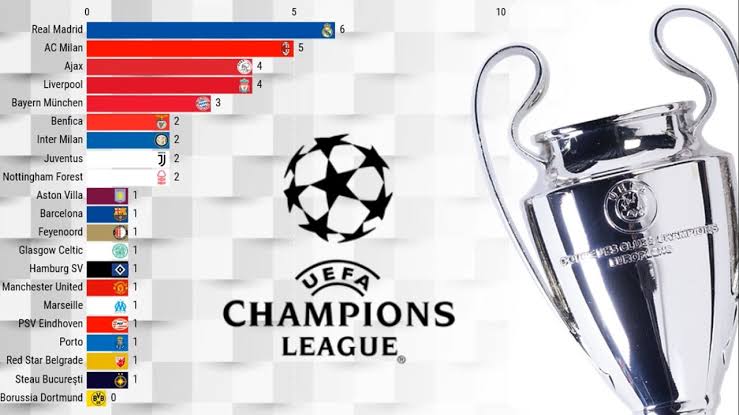UEFA Champions League: Competition Format & History
The UEFA Champions League is a club competition organized by soccer’s European governing body, UEFA.
It is one of the most prestigious and exclusive contests in world football with only the best teams from Europe’s member associations eligible to enter.
History
The competition which is Europe’s number one football event started in 1955/56 as the European cup.
The inaugural edition was won by Spanish Giants Real Madrid who went on to win the first 5 editions.
They unsurprisingly hold the record for most Uefa champions league trophies, having won 15.

Real Madrid are the current holders after defeating Dortmund.
The UEFA Champions League is the most watched sporting event in the world and is considered one of the best club soccer tournaments.
Its popularity has seen a rise in figures in recent years with attendance reaching an all-time high for this time period.
Quick Facts
- Cristiano Ronaldo holds the record for most goal and golden boots in the competition after netting 137goals in 180 appearances.
- Nonetheless Lionel Messi has the highest goal per game ratio for player that have scored over 50 goals in the competition.
- Having netted 123 in 152 appearances amounting to a goal every 102 minutes.
- Moukoko Yussouffa came off the bench for Borussia Dortmund against zenit st Petersburg at age 16 and 18 day to become the youngest player to appear in a champions league game.
- Ansu Fati is the youngest goalscorer after scoring a match day 6 winner against Inter Milan in the 2019/2020 season at 17 year and 40 days old.
Old Format
In 1991, the European Champion Clubs’ Cup became the Uefa Champions League.
The format was expanded to allow more teams to participate in the group stages. Teams were divided into eight groups of four with the top two reaching the knockout stage.
The competition is open to all league champions of UEFA’s member associations (except Andorra, which have no league competition). Additionally, honorary title-holders are allowed to compete but only in their country’s secondary league.
For example, Belfast side Linfield entered for several years while retaining its Irish Premier League title and New Zealand side Auckland City FC entered during the 2006/07 season.
After winning their 9th Chatham Cup but did not compete for a place in following seasons. The first round is played over two legs, home and away.
The ties are decided on aggregate scores with away goals deciding the winners if there is still no clear winner after full-time of the second leg.
The first knockout (or qualifying) phase involves 32 teams – the top eight group finishers from the previous season’s Champions League group stage plus 24 new entrants.
These consist of six automatically enrolled league champions which receive byes to the group stages plus 18 losers from the Champions League playoff round plus four losers in each Champions League preliminary round.
All losers enter at this stage of the tournament except for those who finish fourth in their domestic league competition. They must pass through another playoff before entering at any point of Uefa competition play.
The 32 teams are split into eight groups. The top two from each group (16 in total) progress to the second round, which is played as a double – legged knockout competition.
With each team playing one leg at home, however the final is a one-off encounter. For this stage of the tournament only, the 16 teams are divided into four seeding pots of four teams each.
The winners of groups are drawn against runner ups creating a balanced draw. However, teams from the same association cannot be drawn against one another.
Celtic won the cup without conceding a goal which is a record for most clean sheets during an elimination rounds in any European football cups. They went through nine matches unbeaten in 1967 before finally losing 2–1 in their 10th match, also against Inter Milan.
The competition attracts television coverage and increased ticket sales.
How Will the Champions League Format Change in 2024/25?
Starting from the 2024/25 season, the Champions League is getting a significant makeover, especially when it comes to the group stage. Right now, 32 teams are divided into eight groups of four, but that’s going to change. Instead, 36 teams will participate in what will be called the “league phase,” replacing the traditional group stage. This change allows four more teams to compete with Europe’s best.
In the new format, each team will play eight matches against eight different opponents, rather than facing the same three teams twice (home and away) like before. These eight matches will be split evenly, with four games played at home and four away.
To decide who plays whom, teams will be sorted into four seeding pots. Each team will play two opponents from each pot—one at home and one away. This setup means clubs will get the chance to play against a wider variety of teams, leading to more exciting and competitive matches for everyone involved. It also means that fans will see big teams face off more frequently and earlier in the competition.
The UEFA Champions League has recently taken place in England, Spain, Germany and Italy all of which are the top countries for football clubs.
It has increased its revenue every year during the 2000s to become over €1 billion annually since 2011–12 season.
The majority of this money is due to sponsorship deals with Europe’s premier banks that resulted from European legislation.
Requiring all financial trades on Euro-zone member states to be free of restrictions on where corporations are incorporated or domiciled.
Currently it is estimated that 70% of revenue comes from television rights . For example, BT Sports paid £897 million over three years to broadcast the games domestically.
The 2008–12 broadcasting contracts for the English league amounted to £1.7 billion, according to UEFA figures.
European football clubs are members of their national football association and these associations act as leagues in their own right.
The European governing body, Union of European Football Association (Uefa) is responsible for the correct working of this system.
But takes no part in running or organising any domestic club competition within Europe.
Instead Uefa devotes its time to qualifying teams for international competitions such as World Cup.
And European Championship qualifier was first played after the European Champion Clubs’ Cup was created in 1955.
The tournament was initially a straight knockout competition open club . During the 1990s the tournament began to be expanded.
Allowing more teams from countries with smaller playing pools to have a chance of winning two for some ties.
Also, until 1999–2000 , most rounds were named after sponsors rather than by their order in the draw – comprising round names such as “Arsenal v Roma”, instead of “Round 16” or “1/16 Final”.
In 1993, a group stage was added prior to the knockout phase and this allowed two-legged matches to the champion club of each country.

With so many countries in Europe developing new ways to improve football. Owners have started investing more in players than before with record amounts being spent on average.
The average viewing figures are expected to hit 100 million by 2025.












Post Comment